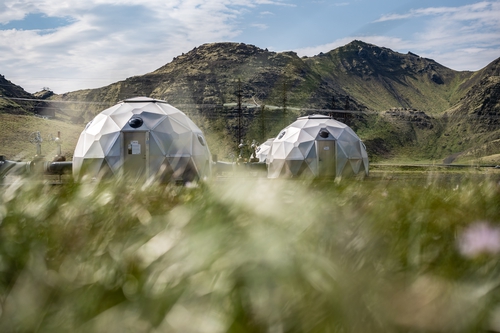Carbfix
Carbfix provides a natural and permanent storage solution by turning CO2 into stone underground in less than two years.
The most important task of this century is to reduce carbon dioxide (CO2) emissions and capture CO2 that has already been released into the atmosphere to abate climate change. CO2 and other greenhouse gases increase the risk of wildfires, accelerate the melting of glaciers and cause weather extremes. Trees and vegetation are not the only form of carbon drawdown from the atmosphere. Vast quantities of carbon are naturally stored in rocks. Carbfix imitates and accelerates these natural processes of carbon removal.

Carbfix dissolves CO2 in water and injects deep into the subsurface where it forms minerals in under two years. It is injected into favorable rocks, such as basaltic rocks, which are reactive and porous. The carbonated Carbfix water reacts with the basaltic rocks releasing metals such as calcium, magnesium, and iron. Over time, these metals combine with the dissolved CO2 and form carbonates, filling up the empty space within the rocks. The carbonates are stable for thousands of years and can thus be considered permanently stored.
Carbfix originally started as a collaboration between Reykjavík Energy, the University of Iceland, CNRS in Toulouse, and Columbia University in 2007. Since then, many universities and research institutes have partaken in the project in various EU projects. Pilot injections were first conducted at Hellisheidi geothermal power plant, where over 95% of CO2 injected was mineralized to carbonate minerals in less than two years. Previously, it was believed that the mineralization process would take hundreds or even thousands of years. The Carbfix technology has been an integral part of the operations at the Hellisheidi plant since 2014 and reduced its CO2 emissions by 30%. Plans call for bringing emissions from the power plant to near-zero in the coming years and in 2022 pilot injections at Nesjavellir geothermal power plant will start. The technology can be adapted to other carbon emitting industries, such as steel, iron, and cement production, to combat climate change.
Since 2017, Carbfix has worked in collaboration with Climeworks, a Swiss company specializing in direct air capture (DAC) technology. Climeworks and Carbfix developed a small DAC and injection pilot plant that captured CO2 from the air and injected into the subsurface for mineralization. Climeworks have announced an upscale in their activities in Iceland and in collaboration with Carbfix and ON Power a new DAC plant, with the capacity of capturing 4,000 tons CO2 per year, will be installed in ON Power’s Geothermal Park and will commence operation in 2021. Hellisheidi is the only place in the world where CO2 is captured directly from the atmosphere and sequestered.
On January 1st, 2020, Carbfix was founded as an independent subsidiary by of Reykjavík Energy. The company’s mission is to be a key instrument to tackle the climate crisis and substantially reduce CO2 emissions. Carbfix is participating in many interesting projects, such as injection of CO2 from the Sorpa landfill site in Álfsnes, the development of CODA Terminal, a cross-border carbon transport and storage hub in Straumsvík, and pilot injections with CO2 dissolved with seawater instead of freshwater in Reykjanes. Also, there are pilot projects with different rock types through the GECO project in Italy, Turkey and Germany.